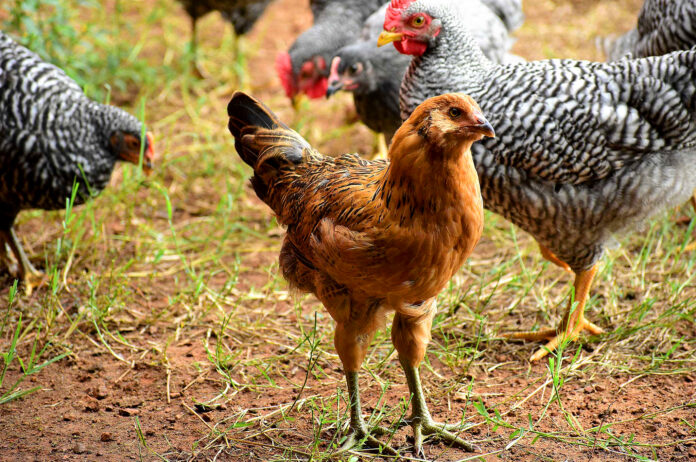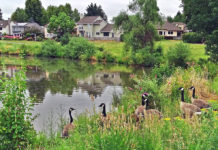Backyard livestock keeping practices can remain largely unchanged under new regulations adopted following months of research, public testimony, and community outreach.
Tigard City Council members, during a Nov. 1 meeting, voted 4-1 in favor of accepting city planners’ recommendation to “beef up” the existing nuisance code that governs livestock ownership by adding several lines directly pertaining to animals.
“In the spirit of requiring cleanliness without writing overly prescriptive or bureaucratic regulations (the new rules) require all feed to be in lidded containers and all livestock to be in enclosed shelters overnight,” Tigard Community Development Planner Hope Pollard said.
The enhanced directive additionally bans roosters, requires animal owners to quickly seek medical care for sick animals, and sets in motion the creation of a resource page that will provide educational materials for would-be and current urban farmers. It does not cap the number of animals per property.
“We believe that education rather than regulation is the appropriate path forward for addressing the finer points of livestock keeping,” Pollard said.
The change comes after months of research and public engagement, during which the city received more than 100 emails and calls on the topic.
Pollard and her team hosted open houses in June and September to gather input and collect community feedback on draft proposals.
They presented three possible courses of action to City Council during an Oct. 17 meeting: the minimalist “tier 1” approach would have made no changes, a moderate approach “tier 2,” which added the new specifications, and a tightly prescriptive “tier 3” approach, which would have banned keeping certain large animals such as horses and capped small animal ownership at six chickens, six rabbits, and three goats, but included a provision allowing the experienced owners to exceed those limits.
Planners endorsed the middle path.
In response to early sentiment favoring tight regulation, Pollard’s team examined practices from other jurisdictions, and consulted with expert researchers from Portland Community College, the Oregon Department of Agriculture, and the Tualatin Soil and Water Conservation District to guide and first-draft proposal that “we felt at the time did a really good job of blending community input and research,” she said.
At a second open house held at Tigard Library in late September, planners unveiled the proposal in a series of posters, maps, and graphs, and gave visitors space to comment, critique, or write suggestions on sticky notes they could attach to each display.
A majority of the 22 attendees found the proposed changes to be overreaching.
By then, public sentiment had already shifted to calls for maintaining the existing system. Pollard pivoted with the input.
“We reminded ourselves that our reason for writing these regulations is to mitigate potential nuisances and hazards associated with an activity that we otherwise see as providing a community benefit,” she said.
Tigard has exclusively used the nuisance code – which limits noise and prohibits conditions that could attract insects and rodents – to govern backyard chickens, ducks, goats, and other farm animals since 2018, when previous language about the placement of chicken coops was dropped.
In that time, the city has received just six complaints related to farm animals.
Though the number is small, Councilor Liz Newton, who cast the sole dissenting vote, voiced reservations about a structure that places the onus of compliance enforcement on neighbors who may be hesitant to report violations.
“Implementing it that way makes me a little nervous,” Newton said, raising questions about how education will be provided and accessed. “It’s not that I’m not supportive of backyard chickens and ducks. I just am a little bit concerned about how this might roll out.”
Mayor Jason Snider advised the incoming mayor and new City Council to revisit the topic annually for three years to ensure the regulations are sufficient.
The city handles complaints by investigating the property in question. When violations are discovered, property owners are issued a citation that provides instructions for correcting the issue and time to make the changes.
Tigard’s livestock regulation practices came into question in early 2022, when Tigard resident Roger Potthoff filed a nuisance complaint against his SW Anne Street neighbors, alleging their urban farm was attracting rodents and repeatedly approached City Council with calls for tighter regulation.
Dozens of neighbors rallied around Elizabeth Sprague and her family, responding with letters and testimony calling the Spragues and their bustling little homestead a jewel in their neighborhood.
“Our way of life and the way we choose to use our property is everything to us and has a positive impact on the community,” Sprague said of the chickens, ducks, goats, and expansive garden that help to feed her large multi-generational household and their neighbors.
Sprague, who is a proponent of education over one-size-fits-all style regulation, was satisfied with the outcome, praising Pollard’s thorough exploration and responsiveness to community feedback.
“Hope and her team have done a wonderful job listening to all sides, being transparent, doing their research, and reaching out to experts,” she said. “The three-tier approach shows their creative thinking and dedication to finding a solution that addresses everybody’s concerns.”






















